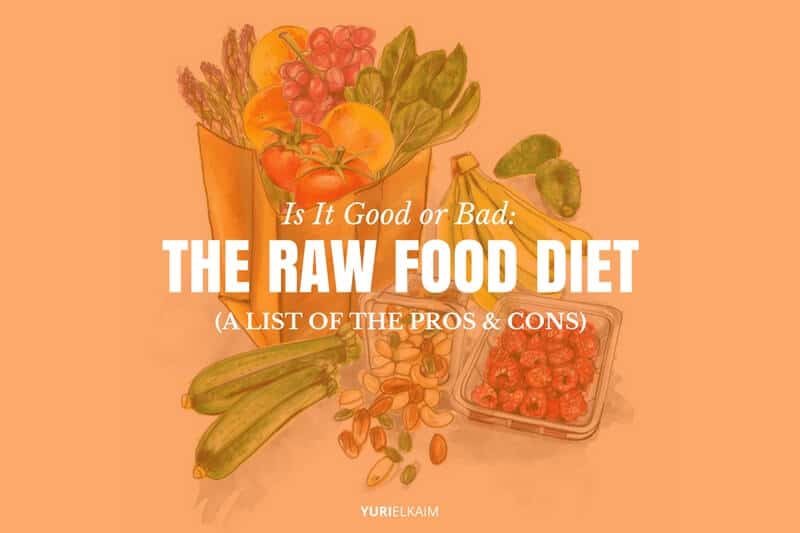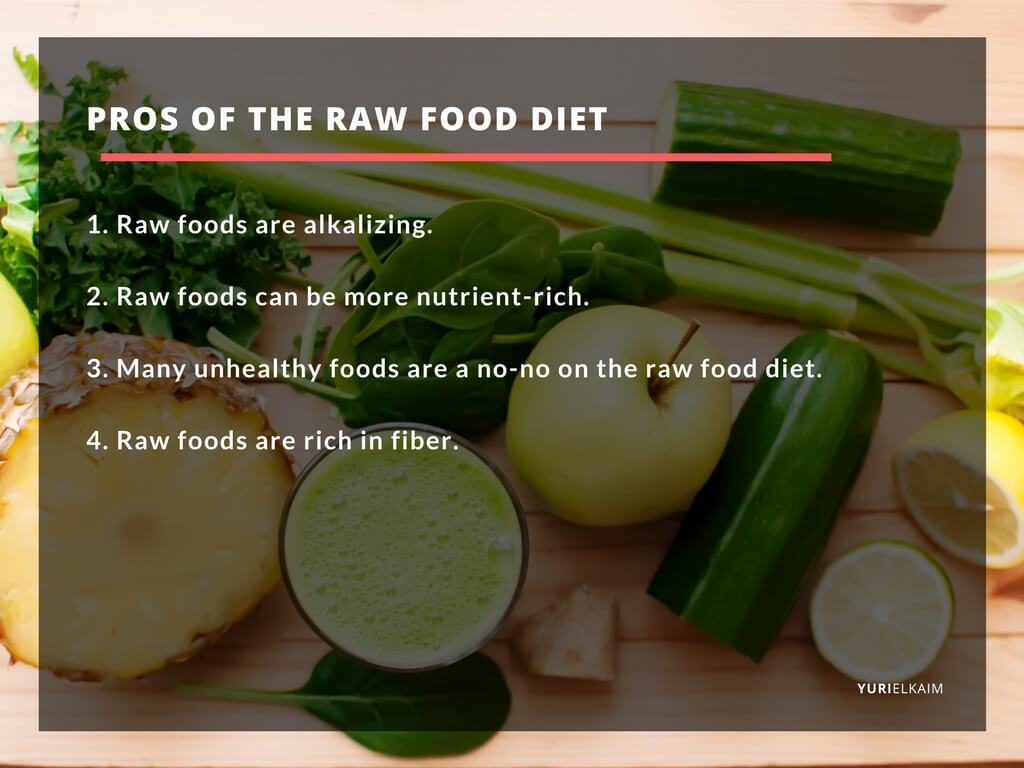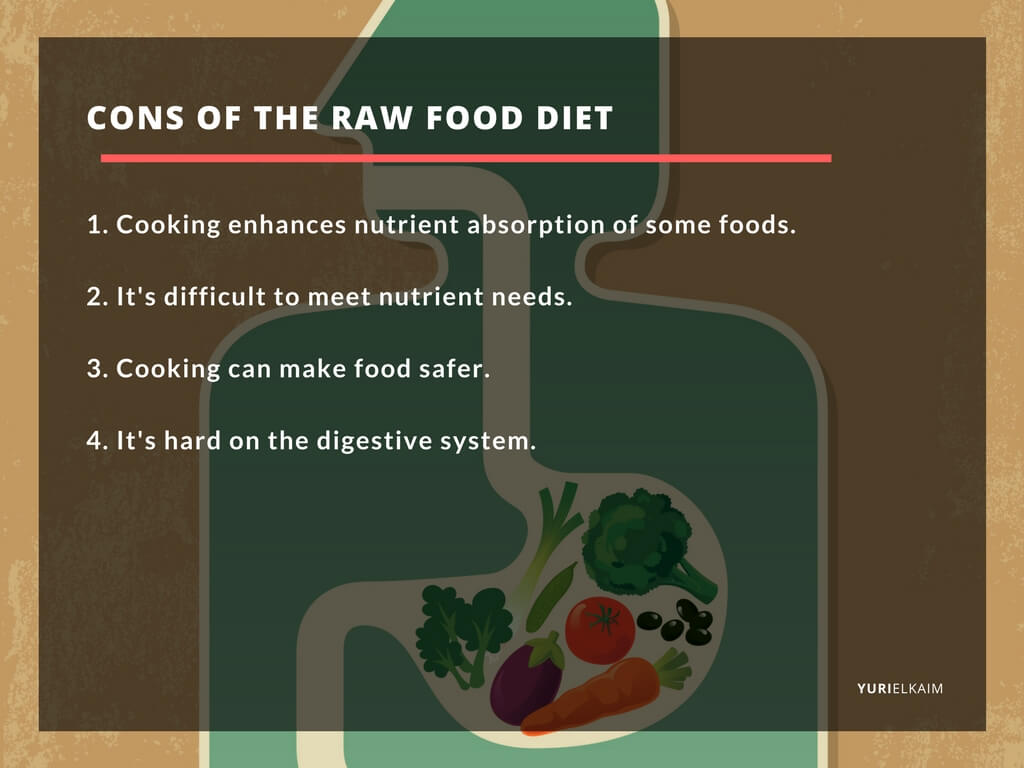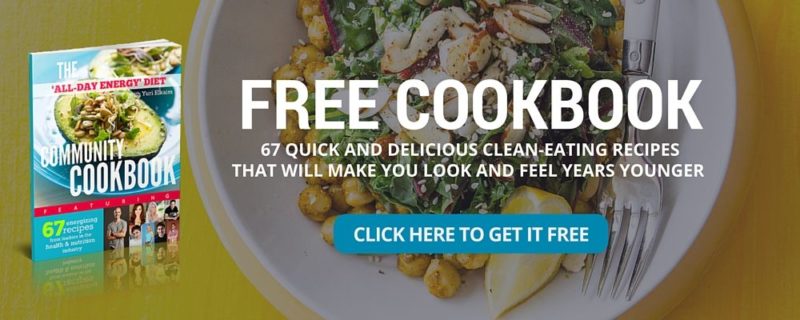In this article
When it comes to food, have you heard that “raw” automatically translates to “healthy”?
Many of us have a preconceived idea that we’re supposed to be eating lots of raw food in order to be healthy.
That’s because raw food is glorified as being higher in vitamins and minerals than cooked foods, plus better for overall health, and most of us are under the impression that more is always better.
And yes, there certainly are some raw food diet benefits. But there are also some definite drawbacks to the diet as well. Before we get into that, though, let’s cover the basics.
What Is The Raw Food Diet?
The whole premise of the raw food diet – or “raw foodism” – is focusing on eating mostly or all unprocessed and uncooked foods.
The idea is that foods that haven’t been cooked or processed will be free of all of the additives and chemicals that are not so good for your health.
There are lots of different deviations in the raw food diet, all with varying ideas about the degree to which food can be cooked.
Some raw food diet followers might also be a little more lenient, with raw foods making up a pretty big portion of their diet but with some cooked foods included as well.
Overall, however, staples of the diet typically include raw fruits and vegetables, nuts, and seeds. Fish, fermented foods, sprouted grains, some meats, and raw dairy products are sometimes also be in the diet.
Diet proponents claim that eating raw has tons of benefits, from cancer prevention to improvements in digestion. Meanwhile, those opposed to the diet note that it’s incredibly difficult – if not impossible – to meet 100 percent of your nutrient needs through raw food alone.
But what are the real raw food diet facts? Can it be healthy to eat a totally raw diet? Or is it a recipe for disaster (and tons of nutritional deficiencies)? Let’s find out.
Raw Food Diet Pros
1. Raw foods are alkalizing.
Eating raw fruits and vegetables is one of the best ways to reduce acidity in the body.
Most vegetables are alkalizing, meaning they can help maintain a proper pH in the body and prevent acid from building up. This is super important, especially when it comes to cancer, because cancer cells really thrive in acidic environments.
Following an alkaline diet can also relieve inflammation, promote heart health, improve digestion, and boost energy levels.
2. Raw foods can be more nutrient-rich.
Cooking has different effects on digestion and absorption of several different nutrients. While some nutrients can actually be enhanced with cooking, other vitamins and minerals are decreased in this process.
Water-soluble vitamins, like B vitamins and vitamin C, are often sensitive to heat and can seep out of fruits and vegetables when cooked. Broccoli, for example, can lose up to 50 percent of its vitamin C content when boiled (1).
Nutrient loss can also occur with other types of cooking too:
- Grilling and broiling can cause loss of vitamins and minerals as nutrient-rich juices drip off.
- B vitamins are depleted during roasting and baking due to the extended cooking time.
- Even microwaving can cause a decrease in the amount of vitamin C by 20 percent to 30 percent (2).
The good thing about eating raw is that you’re able to avoid all of the problems with nutrient loss that come with cooking, allowing you to get the most from your food.
3. Many unhealthy foods are a no-no.
Trans fats, refined sugars, and processed foods are off limits if you’re following a raw food diet. This can definitely be a good thing, since these are all associated with a slew of health problems from diabetes to heart disease.
Raw food diets also tend to be lower in sodium, which can help maintain a healthy blood pressure. When we eat lots of salt, it forces the heart to work harder and can lead to high blood pressure. High blood pressure is the culprit behind two-thirds of all strokes and half of all heart disease (3).
By excluding processed foods and other unhealthy items from your diet, you’re really doing your health a favor.
4. Raw foods are rich in fiber.
Fiber is vital to our health, and most of the foods included in the raw food diet are awesome sources of it.
Besides its ability to promote regularity, relieve constipation, and keep us full throughout the day, fiber boasts a pretty impressive set of health benefits.
Fiber can help lower cholesterol levels, decrease inflammation, and reduce blood pressure (4).
It can keep your digestive system healthy, prevent diseases that affect the colon, and even inhibit the formation of hemorrhoids.
There’s even evidence that getting enough fiber in your diet can help prevent certain types of cancer (5).
Clearly getting plenty of raw fruits and vegetables can have a serious impact on your health. But now let’s look at some of the not-so-great factors to consider with the raw food diet.
Raw Food Diet Cons
1. Cooking enhances nutrient absorption for some foods.
I mentioned earlier how cooking can decrease the levels of certain vitamins and minerals in our food, but did you know that it can also enhance the levels of other nutrients? (6)
Sautéing and stir-frying, in particular, are considered healthy methods of preparing food as the nutrients aren’t leached out into the water and the cooking time is generally shorter.
Stir-frying can increase beta-carotene in carrots up to 6.5 times higher while eating tomatoes sautéed in olive oil causes an 80 percent increase in lycopene blood levels (7, 8).
Another example is with the antioxidant capacity of meats. One study compared the amount of antioxidants in raw versus cooked meats and found that cooking actually increased the antioxidant levels (9).
It can also increase the digestibility and bioavailability for certain nutrients. The protein content in eggs that have been cooked, for example, is 180 percent more digestible than in raw eggs (10).
2. It’s difficult to meet nutrient needs.
Any time you’re eliminating such a big chunk of foods from your diet, it gets more challenging to meet your needs nutritionally.
Of course, this depends entirely on how strict you are on the raw food diet, but following it 100 percent can definitely make things a little trickier.
Raw food diets are typically lower in vitamin D, iron, omega-3 fatty acids, and calcium. Plus, raw vegans could easily be lacking in protein and vitamin B12, too.
In our modern food supply, many foods are fortified with these nutrients, making it easier for us to get what we need. Because the raw food diet excludes any foods that have been processed, however, it can be more challenging to avoid nutrient deficiencies (11).
This can seriously impact health in the long-run and increase the risk of multiple health problems. One study found that those on a raw food vegetarian diet were more likely to have a lower bone mass, which increases the risk of fractures and osteoporosis (12).
3. Cooking can make food safer.
Imagine biting into a big, juicy, tender … and totally raw steak. Ick.
Besides making it a little more appealing, there’s a reason we always cook our meat before we eat it.
There are several dangerous pathogens that are prevalent in meat and poultry, like Salmonella, E. coli, and Listeria. These conditions can cause everything from vomiting to diarrhea to fatigue and even death.
Even eating raw seafood can be risky when it comes to food safety. Vibrio vulnificus and salmonella are two common types of food poisoning from raw or undercooked fish and shellfish (13).
The best way to ensure that meat is safe for consumption and bacteria-free is to cook it. Cooking to a certain temperature kills off harmful bacteria and keeps our food safe.
Following a totally raw diet, especially if it includes raw meats, can actually be pretty dangerous to your health.
4. It’s hard on the digestive system.
Even though the fiber found in raw vegetables is great for gut health, it can definitely be harder to digest. Especially when your digestive tract is already inflamed or irritated, loading up on the raw veggies can be like rubbing sandpaper on an open wound.
Not only that, but certain vegetables have been known to produce some less-than-desirable side effects when eaten raw and in large quantities, like bloating and gas.
Some of the worst offenders? Cruciferous vegetables, like kale, broccoli, and cabbage.
Instead of eating these vegetables raw, steaming them can make them much easier to digest.
Plus, it helps sidestep the negative side effects that come with too much fiber, saving you from dealing with some unpleasant symptoms.
Raw Food Done Right
While I’m not a raw foodist myself, it’s undeniable that there are benefits to including more fruits and vegetables in your diet.
But there are definitely raw food diet pros and cons, and they’re all important factors to consider.
The truth is that we all can benefit from increasing our fruit and vegetable intake, regardless of whether it’s raw or cooked.
For example, if I have guests over for dinner, I probably wouldn’t serve up a big plate of raw broccoli, but instead might steam it. Even though it’s not totally raw, I’m still getting those vitamins and minerals from the broccoli into my diet, which is much better than if I didn’t have any at all.
Moderation is the Key
I recommend including a good assortment of raw foods in your diet, but at a moderate 80/20 ratio of raw to cooked foods.
This helps you take advantage of the health benefits of the raw food diet – but without all the potential drawbacks. It also enables you to actually enjoy your food instead of feeling like you have to wolf it down just to keep it raw.
If you’re looking to get started adding more raw foods into your diet, I’ve compiled an awesome list of 21 raw food diet recipes for you to get you going. Give it a try and see the benefits of eating more raw foods for yourself.
Eating Healthy Made Easy
Want to boost the healthy factor of your weekday meals without going raw? You’ll want to get your FREE copy of the All Day Energy Diet Community Cookbook, which includes a wide array of gluten- and dairy-free meals that are high in vitamins and minerals.
They’re quick and easy to make, taste great, and your body will love them!
Click the banner below to get your copy.




